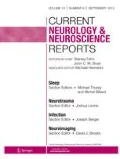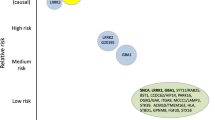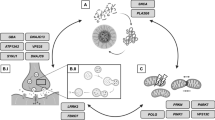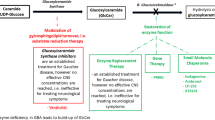Abstract
Purpose of Review
To describe current practices and attitudes about genetic testing for Parkinson’s disease (PD) among neurologists, highlight the changing scene of genetic testing for PD, and provide guidance on facilitating PD genetic testing in a clinical practice.
Recent Findings
Since the 1990s, researchers have discovered several major gene variants contributing to PD etiology. A large body of literature now exists supporting the frequency of these variants in different populations and their effects on phenotype and clinical course. Recently, clinical trials have emerged with therapies targeting genetic forms of PD, specifically LRRK2 and GBA. Despite this growing knowledge, genetic testing for PD is not typically offered by neurologists including movement disorder specialists. Neurologists express concerns about the financial and practical issues of genetic testing as well as the potential impact on their patients. Researchers and specialists in the field are questioning this hesitation as clinical utility and consumer demand increase.
Summary
Consideration of genetic testing for PD is shifting, as we enter a new era of precision medicine and gain clinical knowledge about PD. Barriers to testing, as perceived by clinicians, can be overcome with education, support, and involvement of multiple stakeholders with the goal of making PD genetic testing accessible to all patients.
Similar content being viewed by others
References
Cook Shukla L, Schulze J, Farlow J, Pankratz ND, Wojcieszek J, Foroud T. Parkinson disease overview [Internet]. Seattle: University of Washington; 2019. [cited 2019 Sep 24]. Available from: https://www.ncbi.nlm.nih.gov/books/NBK1223/
Tysnes O-B, Storstein A. Epidemiology of Parkinson’s disease. J Neural Transm (Vienna). 2017;124(8):901–5.1.
Kim CY, Alcalay RN. Genetic forms of Parkinson’s disease. Semin Neurol. 2017;37(2):135–46.
Reed X, Bandrés-Ciga S, Blauwendraat C, Cookson MR. The role of monogenic genes in idiopathic Parkinson’s disease. Neurobiol Dis. 2019;124:230–9.
Nalls MA, Blauwendraat C, Vallerga CL, Heilbron K, Bandres-Ciga S, Chang D, et al. Identification of novel risk loci, causal insights, and heritable risk for Parkinson’s disease: a meta-analysis of genome-wide association studies. Lancet Neurol. 2019;18(12):1091–102.
Biesecker B. Genetic counseling and the central tenets of practice. Cold Spring Harb Perspect Med. 2020;10(3).
Kilbride MK, Bradbury AR. Evaluating web-based direct-to-consumer genetic tests for cancer susceptibility. JCO Precis Oncol. 2020;4:161–9.
Richards S, Aziz N, Bale S, Bick D, Das S, Gastier-Foster J, et al. Standards and guidelines for the interpretation of sequence variants: a joint consensus recommendation of the American College of Medical Genetics and Genomics and the Association for Molecular Pathology. Genet Med. 2015;17(5):405–24.
Cook L, Schulze J, Kopil C, Hastings T, Naito A, Wojcieszek J, et al. Genetic testing for Parkinson disease. Neurology. 2020;11. https://doi.org/10.1212/CPJ.0000000000000831.
Goldman JS, Hahn SE, Catania JW, LaRusse-Eckert S, Butson MB, Rumbaugh M, et al. Genetic counseling and testing for Alzheimer disease: joint practice guidelines of the American College of Medical Genetics and the National Society of Genetic Counselors. Genet Med. 2011;13(6):597–605.
Nance MA. Genetic counseling and testing for Huntington’s disease: A historical review. Am J Med Genet B Neuropsychiatr Genet. 2017;174(1):75–92.
Roberts JS, Uhlmann WR. Genetic susceptibility testing for neurodegenerative diseases: ethical and practice issues. Prog Neurobiol. 2013;110:89–101.
Payne K, Walls B, Wojcieszek J. Approach to assessment of Parkinson disease with emphasis on genetic testing. Med Clin North Am. 2019;103(6):1055–75.
Goldman JS. Genetic testing and counseling in the diagnosis and management of young-onset dementias. Psychiatr Clin North Am. 2015;38(2):295–308.
Verbrugge J, Cook L, Miller M, Rumbaugh M, Schulze J, Heathers L, et al. Outcomes of genetic test disclosure and genetic counseling in a large Parkinson’s disease research study. J Genet Couns. 2020. https://doi.org/10.1002/jgc4.1366.
In-person find a genetic counselor. The National Society of Genetic Counselors. 2020. Available from: https://www.nsgc.org/findageneticcounselor. Accessed April 6, 2020.
Unim B, Pitini E, Lagerberg T, Adamo G, De Vito C, Marzuillo C, et al. Current genetic service delivery models for the provision of genetic testing in Europe: a systematic review of the literature. Front Genet. 2019;10:552.
Alcalay RN, Kehoe C, Shorr E, Battista R, Hall A, Simuni T, et al. Genetic testing for Parkinson disease: current practice, knowledge, and attitudes among US and Canadian movement disorders specialists. Genet Med. 2019;4.
Harbo HF, Finsterer J, Baets J, Van Broeckhoven C, Di Donato S, Fontaine B, et al. EFNS guidelines on the molecular diagnosis of neurogenetic disorders: general issues, Huntington’s disease, Parkinson’s disease and dystonias. Eur J Neurol. 2009;16(7):777–85.
Cook L, Schulze J. Connecting Gaucher and Parkinson disease: considerations for clinical and research genetic counseling settings. J Genet Couns. 2017;26(6):1165–72.
New Genetic Associations for Parkinson’s Disease Identified [Internet]. 23andMe Blog. 2017. Available from: https://blog.23andme.com/23andme-research/new-genetic-associations-parkinsons-disease-identified/. Accessed April 6, 2020.
Shiner T, Mirelman A, Gana Weisz M, Bar-Shira A, Ash E, Cialic R, et al. High frequency of GBA gene mutations in dementia with Lewy bodies among Ashkenazi Jews. JAMA Neurol. 2016;73(12):1448–53.
Lythe V, Athauda D, Foley J, Mencacci NE, Jahanshahi M, Cipolotti L, et al. GBA-associated Parkinson’s disease: progression in a deep brain stimulation cohort. J Parkinsons Dis. 2017;7(4):635–44.
Ligaard J, Sannæs J, Pihlstrøm L. Deep brain stimulation and genetic variability in Parkinson’s disease: a review of the literature. NPJ Parkinsons Dis. 2019;5:18.
Di Fonzo A, Monfrini E, Erro R. Genetics of movement disorders and the practicing clinician: who and what to test for? Curr Neurol Neurosci Rep. 2018;18(7):37.
Sardi SP, Cedarbaum JM, Brundin P. Targeted therapies for Parkinson’s disease: from genetics to the clinic. Mov Disord. 2018;33(5):684–96.
Schneider SA, Alcalay RN. Precision medicine in Parkinson’s disease: emerging treatments for genetic Parkinson’s disease. J Neurol. 2020;267(3):860–9.
Turrini M, Prainsack B. Beyond clinical utility: the multiple values of DTC genetics. Appl Transl Genom. 2016;8:4–8.
Falcone DC, Wood EM, Xie SX, Siderowf A, Van Deerlin VM. Genetic testing and Parkinson disease: assessment of patient knowledge, attitudes, and interest. J Genet Couns. 2011;20(4):384–95.
Maloney KA, Alaeddin DS, von Coelln R, Dixon S, Shulman LM, Schrader K, et al. Parkinson’s disease: patients’ knowledge, attitudes, and interest in genetic counseling. J Genet Couns. 2018;27(5):1200–9.
Hippman C, Ringrose A, Inglis A, Cheek J, Albert AYK, Remick R, et al. A pilot randomized clinical trial evaluating the impact of genetic counseling for serious mental illnesses. J Clin Psychiatry. 2016;77(2):e190–8.
Moldovan R, Pintea S, Austin J. The efficacy of genetic counseling for psychiatric disorders: a meta-analysis. J Genet Couns. 2017;26(6):1341–7.
Gupte M, Alcalay RN, Mejia-Santana H, Raymond D, Saunders-Pullman R, Roos E, et al. Interest in genetic testing in Ashkenazi Jewish Parkinson’s disease patients and their unaffected relatives. J Genet Couns. 2015;24(2):238–46.
Scuffham TM, McInerny-Leo A, Ng S-K, Mellick G. Knowledge and attitudes towards genetic testing in those affected with Parkinson’s disease. J Community Genet. 2014 Apr;5(2):167–77.
Austin J, Semaka A, Hadjipavlou G. Conceptualizing genetic counseling as psychotherapy in the era of genomic medicine. J Genet Couns. 2014;23(6):903–9.
Direct-to-consumer genetic testing. BMJ. 2019. Available from: jhttps://www.bmj.com/content/367/bmj.l5688. Accessed April 6, 2020
Tandy-Connor S, Guiltinan J, Krempely K, LaDuca H, Reineke P, Gutierrez S, et al. False-positive results released by direct-to-consumer genetic tests highlight the importance of clinical confirmation testing for appropriate patient care. Genet Med. 2018;20(12):1515–21.
Weedon MN, Jackson L, Harrison JW, Ruth KS. Very rare pathogenic genetic variants detected by SNP-chips are usually false positives: implications for direct-to-consumer genetic testing | bioRxiv [Internet]. [cited 2020 Mar 12]. Available from: https://www.biorxiv.org/content/10.1101/696799v1
Badalato L, Kalokairinou L, Borry P. Third party interpretation of raw genetic data: an ethical exploration. Eur J Hum Genet. 2017;25(11):1189–94.
Pitini E, D’Andrea E, De Vito C, Rosso A, Unim B, Marzuillo C, et al. A proposal of a new evaluation framework towards implementation of genetic tests. PLoS One. 2019;14(8):e0219755. Published 2019 Aug 5. https://doi.org/10.1371/journal.pone.0219755.
Cohen SA, Bradbury A, Henderson V, Hoskins K, Bednar E, Arun BK. Genetic counseling and testing in a community setting: quality, access, and efficiency. Am Soc Clin Oncol Educ Book. 2019;39:e34–44.
Author information
Authors and Affiliations
Corresponding author
Ethics declarations
Conflict of Interest
Roy N. Alcalay’s research is supported by the NIH, the DoD, the Parkinson’s Foundation, and the Michael J. Fox Foundation. He has received consultation fees from Genzyme/Sanofi, Restorbio and Roche. L. Cook, J. Schulze, C., and A. Naito report no disclosures relevant to the manuscript.
Human and Animal Rights and Informed Consent
This article does not contain any studies with human or animal subjects performed by any of the authors.
Additional information
Publisher’s Note
Springer Nature remains neutral with regard to jurisdictional claims in published maps and institutional affiliations.
This Article is part of the Topical Collection on Movement Disorders
Supplementary Information
ESM 1
(PDF 314 kb)
Rights and permissions
About this article
Cite this article
Cook, L., Schulze, J., Naito, A. et al. The Role of Genetic Testing for Parkinson’s Disease. Curr Neurol Neurosci Rep 21, 17 (2021). https://doi.org/10.1007/s11910-021-01100-7
Accepted:
Published:
DOI: https://doi.org/10.1007/s11910-021-01100-7




